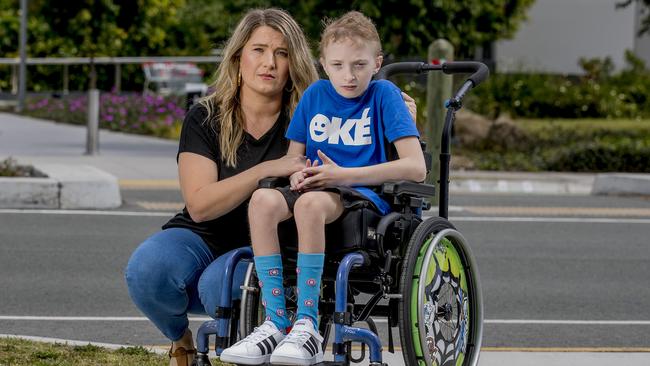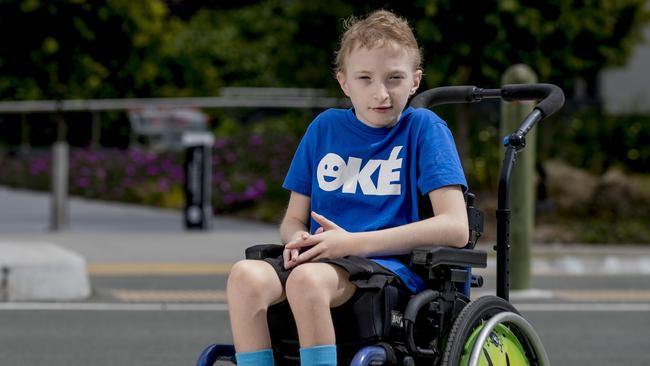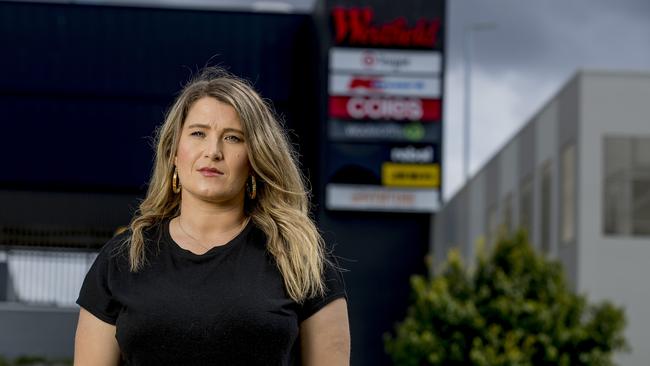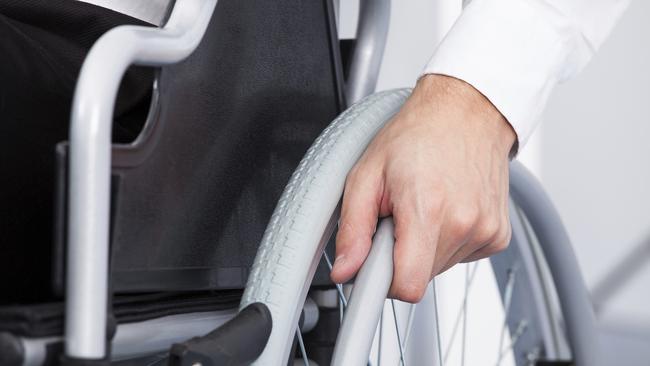Disabled Gold Coast boy Samuel Amiet stranded for hours waiting for taxi
An 11-year-old boy has been left stranded for hours by a Gold Coast taxi firm despite millions given to the industry to buy wheelchair accessible vehicles.
Gold Coast
Don't miss out on the headlines from Gold Coast. Followed categories will be added to My News.
A BOY with severe disabilities was left waiting for hours for a lift home when taxi drivers failed to provide him with a lift.
Samuel Amiet, 11, who has cerebral palsy, CRMCC syndrome, epilepsy, ASD, Perthes’ disease and gastrostomy, was left stranded after an afternoon out with a carer at Coomera Westfield.
They had hoped to go home – just a few kilometres down the road – at 1.50pm, well before school pick-up, but as time dragged on his long wait for a lift then clashed with demand for cabs to collect children heading home from school.

“By 3pm they told me it was because it was school rush hour, which wouldn’t have been a problem if they arrived when they were first called,” said his mother, Simone Amiet.
For wheelchair-bound Samuel, travel options are limited.
The first call to local company 13CABS, which took over Gold Coast Cabs, was made at 1.50pm but two hours later he and his carer were still waiting.
Both the carer and Samuel’s mother reported they were told by the company operators that the drivers did not accept the job even though they were nearby.
MORE NEWS
Queensland vet on ship now missing in South China Sea
Massive new housing estate for prominent site
Vote for Gold Coast’s best brunch
“When I rang to complain later about why my child was left sitting for hours on the side of the road, I was told again the drivers are contractors and they cannot make them take a job,’’ Mrs Amiet said.
“It leaves room for so much discrimination. The company has a monopoly of the market here.
“Are those with disabilities just meant to stay at home for fear they will be left stranded?”
The company boasts more than 100 wheelchair accessible vehicles on its website.
Last year the industry was gifted $21 million by the State Government to help ensure fleets were wheelchair accessible.

Drivers are also paid a $20 lifting fee when they lift passengers who qualify for the taxi subsidy scheme (TSS) into a wheelchair accessible vehicle.
The TSS was estimated to have cost taxpayers $12.8 million last year.
Samuel did not have a TSS card and so a driver was not eligible for the additional $20. Mrs Amiet is concerned this might have been a factor in the decision-making of drivers.
“It is hard to take that my child’s safety and independence are reliant on a $20 payment,” she said.
“Drivers should not just be encouraged to accept wheelchair accessible jobs, it should be a requirement as part of their job. A customer should not be judged on their physical abilities.”
The incident came a year after the family quit regularly using taxis altogether, when Samuel had been left stranded at school.
“I thought surely we can use them this once, it wouldn’t be so bad,” Mrs Amiet said.
“He was so upset by the end of it. They were told to go back and forth around the centre to wait for the taxis.”
Because of the delays Mrs Amiet, who was elsewhere in the city with Samuel’s brother, trekked back to pick up Samuel and the carer.
MOTHER’S DESPAIR WAITING FOR HELP WITH NDIS FUNDING

“You wonder what happens to the people who don’t have anyone there to fight for them. This isn’t something that only happens to him, it happens to everyone who needs access,” she said.
A spokesman for the company said an investigation was under way to learn why no driver accepted the job.
The spokesman said the company would contact Mrs Amiet to apologise.
“Unfortunately, the COVID-19 pandemic has made it harder to staff all the WAT vehicles on the Gold Coast. Some drivers were initially electing to stay home to protect themselves and their families. We are pleased to note that with the easing of restrictions and increased confidence across the community we have seen drivers returning,” the spokesman said.
GOLD COAST RIDESHARE ATTACKS PROMPT CALL FOR IN CAR CAMERAS
The company had training in place for drivers of wheelchair accessible vehicles who “have a responsibility to treat disability work as a priority”.
“Any driver found not doing this would be reprimanded by 13CABS and reminded of their responsibilities. If a driver was found to be behaving like this on a consistent basis without good reason, they would be asked to leave the network,” the spokesman said.
State Transport Department regulators said they were investigating.
THE BIGGER ISSUE
GOLD Coast wheelchair users say they are regularly left waiting for taxis or are rejected for pick-ups, despite state protections.
Under Queensland taxi and booked hire rules, drivers cannot turn down a job unless they have a reasonable excuse, or will have to travel more than 40km or drive outside their network.
Despite the laws, social worker Ross Manning – who has a high level of quadriplegia – said he believed there was a difference in the way taxis treated people with disabilities.
Mr Manning said there were some great drivers, but at times dealing with taxis was frustrating.
He empathised with wheelchair-bound Samuel Amiet, 11, whose mother said he was rejected numerous times for a single job and left waiting at Coomera Westfield.
“I don’t know the inner workings, I don’t know how the decision-making comes about. What I do know is that those in wheelchairs have a much harder time getting a taxi service,” Mr Manning said.
“When you have a situation when a young boy with cerebral palsy is being rejected again and again, there is an issue.”
“It does seem to be a money thing because we know plenty of wheelchair accessible taxis (WAT) are available.”
LISTEN: OLD BOY BACK TO INSPIRE NEXT GENERATION OF TSS STUDENTS

According to State Government figures, WAT vehicles make up 25 per cent of the Gold Coast fleet.
Mr Manning, who has chosen to live near the Helensvale train station for better accessibility, said transport could be restricting.
“You have buses that may be difficult to get or even get on to, depending on your chair,’’ he said.
“The light rail has been a boon for wheelchair users but we are still limited, so the only option is waiting for a taxi.
“There isn’t even a single wheelchair friendly Uber on the Coast.
“You are essentially relying on whether a driver wants to deal with you or wait in the hope of a larger fare – it comes down to the money.
“It is the luck of the draw. You have some drivers who will come to you every time that care, and others who won’t.”
Others in a local spine injury group shared their frustrations online when asked to outline their experiences.
One Gold Coaster wrote: “My very first Indy I rang for a maxi taxi and the operator asked me if there was any other way I could get where I was going because they were keeping the taxis for the tourists.’’
In another instance one described how a driver refused to pick them up. “I rang then and ordered another taxi and he pulled up but complained he had a bad back and really didn’t want to take me because of that in case he had to help me.”
Shine Lawyers Gold Coast Solicitor Amanda Gilmour said the Disability Discrimination Act of 1992 made it illegal for a person providing goods or services to discriminate against another person on the ground of the other person’s disability.
“It is not an unjustifiable hardship for a taxi driver to deliver services to people with disabilities, especially those drivers operating vehicles that are designed for wheelchair access. They are actually trained to transport people with disabilities.”
A Department of Transport and Main Roads spokesman said it was an offence for a driver to refuse to provide a booked hire service or a taxi service to a person using a wheelchair, except in specific circumstances.
The Commonwealth Government’s Disability Standards for Accessible Public Transport 2002 require the response times for accessible vehicles to be the same as for conventional taxis.
Originally published as Disabled Gold Coast boy Samuel Amiet stranded for hours waiting for taxi
